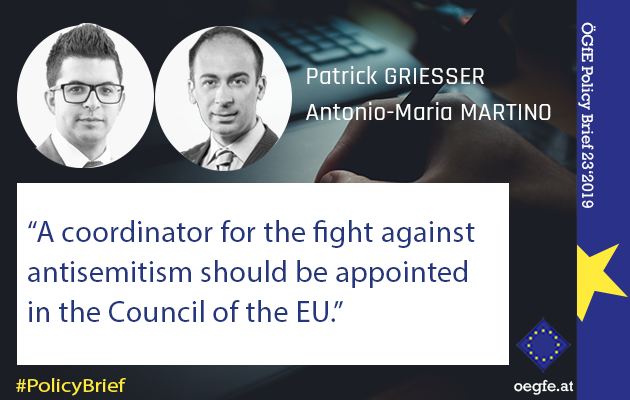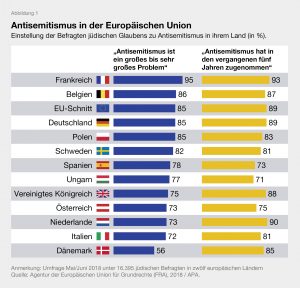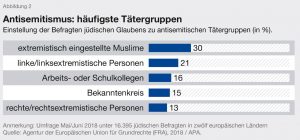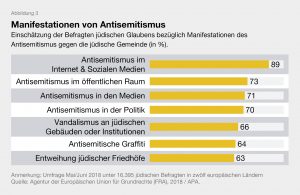Policy Recommendations
- EU Member States should form a broad coalition against neo-Nazi*) and extremist*) groups. They should adopt and implement holistic strategies to prevent and fight antisemitism and to protect Jewish communities, institutions and citizens.
- A coordinator for the fight against antisemitism, similar to the EU counter-terrorism coordinator, should be appointed in the Council of the EU.
- The European Commission should examine legal measures to prevent the dissemination of antisemitic and terrorist content online and promote the protection of Jewish communities, institutions and citizens in EU Member States.
Abstract
For several years now, the number of antisemitic incidents in Europe has been rising dramatically. The terrorist attacks against Jewish targets in Toulouse, Brussels, Paris, Copenhagen and Halle have tragically highlighted the scale of hatred and the need for greater efforts and more decisive action to combat antisemitism. Under the Austrian Presidency, the unanimous adoption at EU level of the Council declaration on the fight against antisemitism and the development of a common security approach to better protect Jewish communities and institutions in Europe on 6 December 2018*) set the political course for an effective fight against antisemitism. It is now up to the EU Member States to take immediate action to prevent antisemitic violence and protect Jewish life in Europe. Historical and contemporary hatred towards Jews affects the whole of Europe. Europe must therefore act together.
*) See definitions and explanations
****************************
Effectively fighting Antisemitism in Europe – challenges and actions
Alarming rise of antisemitism in Europe
Antisemitism is experiencing a resurgence in many European countries, as evidenced by the 2018 survey among the Jewish population conducted by the European Union Agency for Fundamental Rights (FRA). According to the survey, 63% of respondents from twelve countries (Belgium, Denmark, Germany, France, Italy, Spain, the Netherlands, Poland, Sweden, Hungary, Austria and the United Kingdom), in which more than 96% of the Jewish population live within the EU, stated that antisemitism had recently increased significantly; 45% described antisemitism as a “very big problem”.[1]
What is striking is that antisemitism can be displayed across the whole social and political spectrum.[2] The survey demonstrated that among the most frequent perpetrator groups were extremist Muslims (30%), followed by people from the left political spectrum (21%), work or school colleagues (16%), acquaintances (15%) and people who hold right-wing[3] extremist views (13%).
According to the survey, the Jewish population in Europe is confronted with vandalism, insults, threats and violent crimes; however, the largest arena for antisemitism is the Internet and social networks (89 percent).
Although there is very good cooperation between police authorities, the State Criminal Police Office and the Office for the Protection of the Constitution with the Jewish community in Austria, and a correspondingly high feeling of security, Jews in Austria also appear to be increasingly insecure and afraid of revealing their identity in public: more than 7 out of 10 people (73 percent) consider antisemitism to be a “big” or “very big” problem, and 75 percent of those surveyed believe that antisemitism has encreased in the last five years.[4]
Important milestones at the European level in the fight against antisemitism
At the latest since the right-wing populists entered the European Parliament under the leadership of Jean-Marie Le Pen in 1984, the European institutions and organizations (EU, Council of Europe but also the OSCE) have increased their efforts to combat racism and antisemitism.
A first important step in the fight against antisemitism was the establishment of the European Commission against Racism and Intolerance (ECRI), set up in 1994 by the first summit of Heads of State and Government of the Member States of the Council of Europe to combat the growing problems of racism, xenophobia, antisemitism and intolerance. ECRI is mandated to monitor and evaluate Member States’ legislation, policies and other measures to combat racism, xenophobia, antisemitism and intolerance and to propose further initiatives at local, national and European level.[5]
In 1997, the European Monitoring Centre on Racism and Xenophobia (EUMC) was established by Council Regulation (EC) 1035/97[6], which was transformed into the European Fundamental Rights Agency in 2007. The primary task of the EUMC was to provide the Community and its Member States with objective, reliable and comparable information and data on racism, xenophobia, islamophobia and antisemitism at the European level in order to help the EU and its Member States to establish measures or formulate courses actions against racism and xenophobia.[7]
In 2003, the EUMC published a first study on the manifestations of antisemitism in the EU, which documented the increasing attacks on Jewish institutions and the Jewish community.[8] On 31 March 2004, a further 345-page report on antisemitism in (at that time) 15 Member States of the European Union was published, highlighting the difficulties in collecting and comparing data on antisemitism within the EU Member States due to the lack of a uniform, universally applicable definition of antisemitism.[9]
In a next step, the EUMC together with non-governmental organizations (NGOs) and experts, therefore, proposed early 2005 a working definition that formally defines antisemitism as a certain perception of Jews as well as a verbal or physical act directed against Jewish communities, institutions and citizens. The International Holocaust Remembrance Alliance (IHRA) continued to develop a common definition of antisemitism and adopted a legally non-binding but internationally recognized working definition on 15 May 2016.[10]
In 2000, the first comprehensive anti-discrimination laws were introduced at European level: a directive on equal treatment between persons irrespective of racial[11] or ethnic origin[12] and a directive on equal treatment in employment and occupation irrespective of religion or belief, disability, age or sexual orientation were adopted that year.[13]
In 2008, the Council unanimously adopted the EU Framework Decision on combating racism and xenophobia through criminal law.[14] However, according to a report by the European Commission, the criminal prosecution of hate crimes and hate speech in many EU countries has serious shortcomings.[15]
Another important milestone was the appointment of Katharina von Schnurbein as the first European Commission Coordinator on Combating Antisemitism in December 2015.[16] Her role is to ensure that the concerns of Jewish communities are heard at the political level of the Commission and to assist the Commission in coordinating its work as part of its comprehensive strategy to combat racism, xenophobia and other forms of intolerance.
In May 2016, the European Commission, together with four major IT companies (Facebook, Microsoft, Twitter and YouTube), published a Code of Conduct against hate speech on the Internet to protect freedom of expression while creating obstacles to hate speech and terrorist propaganda.[17]
On 1 June 2017, the European Parliament adopted a resolution on combating antisemitism[18], calling on all EU Member States to take a firm stand against antisemitism and to adopt the non-legally binding definition of antisemitism of the International Holocaust Remembrance Alliance (IHRA).[19] In addition, special bodies are to be set up in various social policy areas such as the media and education, but also in internal security, to raise awareness of the issue.
On 6 December 2018, under the Austrian Presidency of the EU Council, the Justice and Home Affairs Ministers of all 28 EU Member States adopted the aforementioned declaration on the fight against antisemitism and the development of a common security approach to better protect Jewish communities and institutions in Europe.
The recent 2019 attack on a Jewish synagogue in Halle, Germany demonstrates more than ever the need for the above measures to be implemented by EU Member States in order to take sustainable steps in the fight against antisemitism and to ensure the security of Jewish institutions.
Concrete and sustainable measures in the fight against antisemitism
Adopt and apply the International Holocaust Memorial Alliance (IHRA) definition of antisemitism
The non-legally binding IHRA working definition of antisemitism, including its eleven illustrative examples, should be used as part of efforts to fight antisemitism and as a guide for a common standard. All EU Member States should adopt the IHRA working definition and use it as a reference tool to ensure effective detection and combating of all forms of antisemitism.[20]
Develop and implement national strategies to combat antisemitism
EU Member States should adopt specific strategies to fight antisemitism and protect Jewish communities, institutions and citizens or set concrete targets and measures to combat antisemitism in their national action plans against racism. Such holistic strategies should build on the IHRA definition of antisemitism, be based on valid data and include preventive, reactive and also shaping elements[21] to ensure peaceful coexistence of people of different cultures and religions in accordance with European fundamental rights and values. They should receive political support at national and local levels and be developed in cooperation with local Jewish communities and organizations.
Strengthen national coordination and policy implementation
At the EU level, the Office of the Coordinator on Combating Antisemitism should be strengthened to reflect the challenging coordinating role. At best, consideration should be given to transferring this role from the European Commission to the Council of the EU in order to be closer to the policies of the Member States. Several Member States have already appointed national coordinators, with some (such as Germany and France) providing the offices with relevant human resources. Other Member States should either follow this example or, through appropriate inter-ministerial coordination, ensure that regular coordination and monitoring of the implementation of national policies takes place.
Law enforcement cooperation in the fight against right-wing extremism
In recent years, the focus of the EU has been on the fight against radical Islamic terrorism. While this is still an important topic, however – as the events in Christchurch and Halle tragically illustrate – the EU must increase its efforts to combat right-wing extremist terrorism. For the first time in the recent past, the interior ministers of the EU Member States exchanged views on this issue at the Council meeting on 7 and 8 October 2019. They agreed that various aspects concerning the fight against right-wing extremism needed further work, such as creating a better overview of violent right-wing extremism and terrorism, continuing to identify and share best practices to strengthen the prevention, detection and combating of violent extremism and terrorism, or tackling the spread of illegal right-wing extremist content online and offline.[22] However, this can only be a first step and there is an urgent need to adopt and implement a robust action plan against right-wing extremism.
Ensuring the security of Jewish communities and institutions
Consideration should be given, on the basis of common risk assessments, to improving cooperation between law enforcement authorities of EU Member States and Jewish institutions and organizations, and to ensuring regular exchange between relevant actors.
EU Member States must ensure that members of their respective Jewish communities are able to live in safety in the same way as all other citizens and therefore they have to provide adequate funding for security measures. This presupposes, on the one hand, an understanding of the extent of the threat to Jewish communities and, on the other hand, the concrete security priorities and needs of Jewish communities. Consideration should be given, on the basis of common risk assessments, to improving cooperation between law enforcement authorities of EU Member States and Jewish institutions and organizations, and to ensuring regular exchange between relevant actors.
Implementing effective measures in education
Like all forms of discrimination and intolerance, antisemitism must be prevented through education. The European Commission should therefore develop a pedagogical guide to help EU Member States proactively tackle antisemitism through education and sustainably promote tolerance.[23]
The denial of the Holocaust is regarded by a good half of Europeans (53 percent) as a problem in their country.
According to a Eurobarometer survey of January 2019, only 3 percent of Europeans know Jewish history and customs “very well”, and 68 percent say they are “not informed”. The denial of the Holocaust is regarded by a good half of Europeans (53 percent) as a problem in their country. Only four out of ten Europeans on average believe that there is sufficient education about the Holocaust in schools.[24]
Curricula and textbooks should be free from political propaganda, discrimination and hatred, especially concerning the history and culture of Jewish communities in Europe.
EU Member States should therefore promote knowledge about the Holocaust and the historical importance of Jewish communities and citizens in the development of Europe and ensure that teachers are adequately trained in schools and in training and integration courses. Curricula and textbooks should be free from political propaganda, discrimination and hatred, especially concerning the history and culture of Jewish communities in Europe.
In order to break down prejudices and counter stereotypes, the European Union should strengthen relations between European and Israeli civil society.
In order to break down prejudices and counter stereotypes, the European Union should strengthen relations between European and Israeli civil society. The European Union’s Erasmus+ program for education, youth and sport should develop exchanges with Israeli educational institutions and set up a special coordination center for EU-Israel youth exchanges as an umbrella for all youth cooperation.
EU-wide studies on antisemitism
Research on antisemitism has been largely limited to historical and theoretical aspects.
The latest FRA survey on the experiences and perceptions of antisemitism among European Jews is an excellent tool and should be conducted regularly at least every five years. Nevertheless, the lack of comparable data on antisemitism across the EU remains a challenge and hinders targeted responses. Research on antisemitism has been largely limited to historical and theoretical aspects. The European Commission should launch a study on the spread of antisemitism among the EU as a whole, both in terms of society overall and in terms of key subgroups within the population, in particular the extreme left, extreme right and extremist Christians and Muslims.
Condemnation of antisemitic discrimination against Israel and Israeli citizens worldwide
Israeli citizens are regularly confronted with international exclusion in culture, sport, science and art. For example, the Malaysian government has imposed a comprehensive ban on Israeli citizens taking part in public events in Malaysia[25] and an Arab airline refuses to carry Israeli citizens on its fleet.[26]
As a close partner of the State of Israel, the European Union should condemn and respond to such discrimination by demonstrating solidarity with Israel and its citizens in line with the IHRA definition of antisemitism and by adopting a clear stance against antisemitism and anti-Zionism as a prerequisite for all relations with Israel.
Summary and outlook
The latest antisemitically motivated terrorist attack on a synagogue in Halle is the latest escalation of the threateningly rising hatred against Jews in Europe and worldwide. Antisemitism must no longer be allowed a place in Europe, not only because of Europe’s historical responsibility, but also because violent antisemitic attacks on Jewish institutions or individuals are directed against the values of free, democratic and open societies and, ultimately, against the values on which the European Union is built.
The latest antisemitically motivated terrorist attack on a synagogue in Halle is the latest escalation of the threateningly rising hatred against Jews in Europe and worldwide.
In the past, important measures have been taken at the European level, although the European Union’s competence in the fight against antisemitism remains limited. In order to combat antisemitism in a sustainable way, it is not only the European level that is called for, but in particular also at the national level.
As a next step, the European Commission should examine legal measures to ensure the prevention of the distribution of illegal antisemitic content online and the downloading and distribution of videos showing antisemitic and other terrorist attack, and promote the protection of Jewish institutions in EU Member States.
Furthermore, in order to better coordinate and implement the policies of the Member States to prevent and combat antisemitism, a coordinator for the fight against antisemitism similar to the EU counter-terrorism coordinator should be appointed in the Council.
Due to its historical responsibility, Austria has the task of dealing intensively with the fight against antisemitism and has recently been able to set important accents and develop strategies at both national and European level:
- On 25 April 2017, Austria became the third of 18 countries to adopt the IHRA definition of antisemitism.[27]
- The rapporteur for the European Parliament resolution on combating anti-semitism, which was adopted by a two-thirds majority on 1 June 2017, was Austrian MEP Heinz K. Becker; other Austrian MEPs are active in various bodies at European level in the fight against antisemitism.[28]
- On 6 December 2018, under the Austrian Council Presidency, the Justice and Home Affairs Ministers of all 28 EU Member States adopted a declaration against antisemitism.
- On 15 March 2019, the President of the National Council, Wolfgang Sobotka, presented the study “Antisemitism in Austria 2018”[29]; on this basis, the Austrian Parliament recently established the initiative “Education against Prejudice”. Within the framework of workshops for pupils and apprentices, educational work is carried out on the topics of antisemitism and racism.[30]
This path taken in the fight against antisemitism must be continued consistently and uncompromisingly on both the European and national level and appropriate political priorities must be set.
It is now up to EU Member States to form a broad united coalition against right-wing extremist, neo-Nazi and other extremist groups (regardless of political spectrum or religious opinion) and to urgently implement effective measures in the fight against antisemitism. They should work closely with the actors involved, in particular Jewish communities and civil society organizations, to prevent and combat antisemitism more effectively.
Definitions and explanations
(1) The term “neo-Nazism” is used to describe associations of persons and activities that contain a commitment to the ideology of National Socialism and are oriented towards the establishment of a totalitarian leader state along the lines of the “Third Reich”. Further reading: https://www.bpb.de/politik/extremismus/rechtsextremismus/41312/was-ist-rechtsextrem?p=all
(2) The Federal Office for the Protection of the Constitution of Germany defines extremism as a fundamental rejection of the democratic constitutional state. This includes all efforts that are directed against the core of the Basic Law or the liberal democratic constitutional order as a whole. The term is a collective term for anti-democratic efforts and encompasses both left-wing extremism and right-wing extremism, but also religious fundamentalism, which cannot be adequately placed on the left-right axis. Further reading: https://www.kas.de/web/europa/extremismus-in-deutschland
(3) http://data.consilium.europa.eu/doc/document/ST-15213-2018-INIT/de/pdf
[1] https://fra.europa.eu/en/publication/2018/2nd-survey-discrimination-hate-crime-against-jews
[2] Antisemitism occurs in different forms and can be found in all social classes, all levels of education and across all political spectrums. While antisemitism in the politically right-wing spectrum is mostly related to a racist motive, antisemitism in the Muslim or left-wing spectrum is often based on solidarity with Palestine, Anti-Americanism and Anti-Capitalism.
[3] According to the definition of the Austrian State Security authorities right-wing extremism does not appear as a homogeneous movement but in various forms incorporating nationalist, racist and antisemitic ideology elements to different degrees and pursuing correspondingly different objectives. It is governed by the idea that belonging to a specific ethnic group, nation, or race determines a human being’s value. This right-wing extremist notion is fundamentally inconsistent with the Basic Law, where human dignity is the central value. Further reading: https://www.bvt.gv.at/401/files/Verfassungsschutzbericht2018.pdf
[4] https://fra.europa.eu/sites/default/files/fra_uploads/fra-2018-experiences-and-perceptions-of-antisemitism-survey_en.pdf, pages 12-13.
[5] European Commission against Racism and Intolerance (ECRI): Second Report on Austria, Strasbourg 2000, p. 3.
[6] https://eur-lex.europa.eu/legal-content/DE/TXT/?uri=CELEX:31997R1035
[7] Mc Clintock, M., & Sunderland, J.: Antisemitism in Europe, 2004, p. 6-12.
[8] https://fra.europa.eu/en/publication/2010/manifestations-antisemitism-eu-2002-2003
[9] Mc Clintock, M., & Sunderland, J.: Antisemitism in Europe, 2004, p. 6-12.
[10] Ullrich, P.: Expert Opinion on the “Working Definition of AntiSemitism” of the International Holocaust Remembrance Alliance, Berlin 2019, p. 7.
[11] The European Union rejects theories which attempt to determine the existence of separate human races. The use of the term ‘racial origin’ in this Directive does not imply an acceptance of such theories.
[12] https://eur-lex.europa.eu/legal-content/DE/TXT/PDF/?uri=CELEX:32000L0043&from=EN
[13] https://eur-lex.europa.eu/legal-content/de/TXT/?uri=CELEX:32000L0078
[14] https://eur-lex.europa.eu/legal-content/DE/TXT/PDF/?uri=CELEX:32008F0913&from=de
[15] https://eur-lex.europa.eu/legal-content/DE/TXT/PDF/?uri=CELEX:52014DC0027&from=DE
[16] https://ec.europa.eu/home-affairs/what-is-new/news/news/2015/20151201_2_en
[17] https://eur-lex.europa.eu/legal-content/DE/TXT/PDF/?uri=CELEX:52014DC0027&from=DE
[18] http://www.europarl.europa.eu/doceo/document/TA-8-2017-0243_DE.html?redirect
[19] https://www.holocaustremembrance.com/de/node/196
[20] https://eurojewcong.org/ejc-in-action/statements/jewish-organisations-announce-joint-action-plan-for-combatting-antisemitism-in-europe/?fbclid=IwAR0Wh19NzlckSo_GDDxMuNGUCfEqDumiChxsnJgQJhmoyzG6Ktjlf8yy3HA
[21] Cf. on this three-stage approach to security policy the Austrian Security Strategy 2013 (http://www.bundesheer.at/pdf_pool/publikationen/sicherheitsstrategie_engl.pdf)
and the Ministerial Declaration adopted at the “Tackling Jihadism Together” conference in Vienna on 20 March 2015 (https://bmi.gv.at/bmi_documents/1658.pdf).
[22] https://www.consilium.europa.eu/de/meetings/jha/2019/10/07-08/
[23] https://www.osce.org/de/odihr/411170?download=true
25] http://data.europa.eu/euodp/en/data/dataset/S2220_90_4_484_ENG
[25] https://www.dw.com/de/malaysia-verbietet-israelis-teilnahme-an-öffentlichen-veranstaltungen/a-47109570
[26] https://www.welt.de/vermischtes/article181664270/Kuwait-Airways-nimmt-Israeli-nicht-mit-Klage-gescheitert.html
[27] So far, the working definition has been adopted by the following governments: United Kingdom, Israel, Austria, Scotland, Romania, Germany, Bulgaria, Belgium, Sweden, Lithuania, Republic of Northern Macedonia, Netherlands, Slovakia, Republic of Moldova, Czech Republic, Hungary, France, Canada.
[28] From November 2017 to July 2019, Austrian MEP Heinz K. Becker was chairman of the European Parliament’s working group against antisemitism (EP-WGAS), followed by MEP Karoline Edtstadler; MEP Lukas Mandl heads the interparliamentary group “Transatlantic Friends of Israel”.
[29] https://www.antisemitismus2018.at/neue-initiative-gegen-antisemitismus/
[30] https://www.ots.at/presseaussendung/OTS_20190911_OTS0097/parlament-sobotka-praesentiert-neue-initiative-gegen-antisemitismus
- APA/OTS (2019): Parlament: Sobotka präsentiert neue Initiative gegen Antisemitismus, from 11.11.2019, available at: https://www.ots.at/presseaussendung/OTS_20190911_OTS0097/parlament-sobotka-praesentiert-neue-initiative-gegen-antisemitismus (accessed: 29.10.2019).
- Bergmann, W. Wetzel, J. (2003). EUMC – Synthesis Report: Manifestations of anti-Semitism in the European Union, Vienna, March 2003, available at: http://www.hagalil.com/antisemitismus/europa/eu-studie.htm (accessed: 20.11.2019).
- Benz, W. (2010). Handbuch des Antisemitismus. Judenfeindschaft in Geschichte und Gegenwart, 3.
- Federal Ministry of the Interior/Federal Office for the Protection of the Constitution and Counterterrorism (Ed.). Report 2018, available at: https://www.bvt.gv.at/401/files/Verfassungsschutzbericht2018.pdf (accessed: 20.11.2019),
- Deutsche Welle (2019): Malaysia verbietet Israelis Teilnahme an öffentlichen Veranstaltungen, from 16.01.2019, available at: https://www.dw.com/de/malaysia-verbietet-israelis-teilnahme-an-öffentlichen-veranstaltungen/a-47109570 (accessed: 23.10.2019).
- EC – European Commission (January 2019): Special Eurobarometer 484: Perceptions of antisemitism, available at: http://data.europa.eu/euodp/en/data/dataset/S2220_90_4_484_ENG (accessed: 23.10.2019).
- EC – European Commission, Press Release (2016), European Commission and IT companies announce Code of Conduct to combat illegal hate speech on the Internet, 31 May 2016, available at: https://ec.europa.eu/commission/presscorner/detail/de/IP_16_1937 (accessed 20.11.2019).
- Elman, R. A., & Grimm, M. (2016). Augmenting the European Union’s Response to Antisemitism. Israel Journal of Foreign Affairs, 10(3), 457-469.
- EP (2013). European Parliament resolution of 14 March 2013 on strengthening the fight against racism, xenophobia and hate crime, available at: https://www.europarl.europa.eu/sides/getDoc.do?pubRef=-//EP//TEXT+TA+P7- TA-2013-0090+0+DOC+XML+V0//DE (accessed: 23.10.2019).
- EP (2017). European Parliament resolution of 1 June 2017 on combating Antisemitism, available at: https://www.europarl.europa.eu/doceo/document/TA-8-2017-0243_DE.html?redirect (accessed: 23.10.2019).
- EP – European Parliament (2019). Plenary debate 21 October 2019, Strasburg: The danger of violent right-wing extremism (in the light of the recent events in Halle, Germany) available at: https://www.europarl.europa.eu/plenary/de/debate-details.html?date=20191021&detailBy=date (accessed: 23.10.2019).
- EU-Observer (2019): New US-Israel-EU parliament group launched, available at: https://euobserver.com/tickers/145405 (accessed: 29.10.2019)
- EURLEX (1997) – Council Regulation (EC) No 1035/97 of 2 June 1997 establishing a European Monitoring Centre on Racism and Xenophobia, available at: https://eur-lex.europa.eu/legal-content/DE/TXT/?uri=CELEX:31997R1035 (accessed 20.11.2019).
- EURLEX (2000) – Council Directive 2000/43/EC of 29 June 2000 implementing the principle of equal treatment between persons irrespective of racial or ethnic origin, available at: https://eur-lex.europa.eu/legal-content/DE/TXT/PDF/?uri=CELEX:32000L0043&from=EN. (accessed: 23.10.2019).
- EURLEX (2000) – Council Directive 2000/78/EC of 27 November 2000 establishing a general framework for equal treatment in employment and occupation, available at: https://eur-lex.europa.eu/legal-content/de/TXT/?uri=CELEX:32000L0078 (accessed: 23.10.2019).
- EURLEX (2008) – Council Framework Decision 2008/913/JHA of 28 November 2008 on combating certain forms and expressions of racism and xenophobia by means of criminal law, available at: https://eur-lex.europa.eu/legal-content/DE/TXT/PDF/?uri=CELEX:32008F0913&from=de (accessed: 23.10.2019).
- EURLEX (2014) – Report from the Commission to the European parliament and the Council on the implementation of Council Framework Decision 2008/913/JHA on combating certain forms and expressions of racism and xenophobia by means of criminal law, available at: https://eur-lex.europa.eu/legal-content/DE/TXT/PDF/?uri=CELEX:52014DC0027&from=DE (accessed: 23.10.2019).
- European Commission against Racism and Intolerance (2000). Second Report on Austria, adopted on 16 June 2000, available at: https://rm.coe.int/second-report-on-austria-german-translation-/16808b5559 (accessed: 20.11.2019).
- FRA (2019) – Experiences and perceptions of antisemitism – Second survey on discrimination and hate crime against Jews in the EU, available at: https://fra.europa.eu/en/publication/2018/2nd-survey-discrimination-hate-crime-against-jews (accessed: 23.10.2019).
- IHRA – International Holocaust Remembrance Alliance (2016). Working Definition of Antisemitism, available at: https://www.holocaustremembrance.com/de/node/196 (accessed: 23.10.2019).
- Jesse, E. Definitions: Extremism. Konrad Adenauer Foundation, available at: https://www.kas.de/web/europa/extremismus-in-deutschland (accessed: 20.11.2019).
- Joint Action Plan for combatting Antisemitism (2019), available at: https://eurojewcong.org/ejc-in-action/statements/jewish-organisations-announce-joint-action-plan-for-combatting-antisemitism-in-europe/?fbclid=IwAR0Wh19NzlckSo_GDDxMuNGUCfEqDumiChxsnJgQJhmoyzG6Ktjlf8yy3HA (accessed: 23.10.2019)
- Kuebler, E. (2005). Antisemitismusbekämpfung als gesamteuropäische Herausforderung: Eine vergleichende Analyse der Maßnahmen der OSZE und der EUMC (Vol. 148). LIT Verlag Münster.
- Mc Clintock, M., & Sunderland, J. (2004). Antisemitism in Europe. Human Rights first, available at: https://www.humanrightsfirst.org/wp-content/uploads/pdf/GR-Antisem-II-web.pdf (accessed 20.11.2019).
- Nandlinger, G. (2008). When do we speak of right-wing extremism, right-wing radicalism or neo-Nazism…?, Bundeszentrale für politische Bildung, 25.7.2008, available at: https://www.bpb.de/politik/extremismus/rechtsextremismus/41312/was-ist-rechtsextrem?p=all (accessed: 20.11.2019).
- ODIHR, OSCE. “Addressing Anti-Semitism Through Education: Guidelines for Policymakers [Brochure].” (2018).
- Peham, A., & Rajal, E. (2010). Erziehung wozu? Holocaust und Rechtsextremismus in der Schule. na.
- Rabinovici, D., Speck, U., & Sznaider, N. (2004). Neuer Antisemitismus?: Eine globale Debatte. Suhrkamp Verlag.
- Rat der Europäischen Union (2018). Council Declaration on the fight against antisemitism and the development of a common security approach to better protect Jewish communities and institutions in Europe from 6.12.2018, available at: http://data.consilium.europa.eu/doc/document/ST-15213-2018-INIT/de/pdf (accessed: 23.10.2019).
- Salzborn, S. (2013). Israelkritik oder Antisemitismus? Kriterien für eine Unterscheidung. Kirche und Israel. Neukirchener Theologische Zeitschrift, 28(1), 5-16.
- Ullrich, P. (2019). Expert opinion on the “Working Definition of Anti-Semitism” of the International Holocaust Remembrance Alliance. Rosa Luxemburg Foundation, PAPERS 2/2019.
- von Schnurbein, K. (2016). Combating Antisemitism in the European Union. Israel Journal of Foreign Affairs, 10(2), 283-287.
- Welt Panorama (2018): Kuwait Airways verweigert Mitnahme von Israeli – Klage gescheitert, from 25.09.2018, available at: https://www.welt.de/vermischtes/article181664270/Kuwait-Airways-nimmt-Israeli-nicht-mit-Klage-gescheitert.html (accessed: 23.10.2019).
- Whine, M. (2014). Combating Antisemitism in Europe. Israel Journal of foreign Affairs, 8(1), 81-94.
International
- European Coordinator on Combating Antisemitism
https://ec.europa.eu/info/policies/justice-and-fundamental-rights/combatting-discrimination/racism-and-xenophobia/combating-antisemitism_en - European Parliament Working Group on Antisemitism
https://ep-wgas.eu - FRA – Fundamental Rights Agency
https://fra.europa.eu/de - IHRA – International Holocaust Remembrance Alliance
https://www.holocaustremembrance.com - ODIHR – Office for Democratic Institutions and Human Rights
https://www.osce.org/odihr - ECRI – European Commission against Racism and Intolerance
https://www.coe.int/en/web/european-commission-against-racism-and-intolerance - SICSA – Vidal Sassoon International Center for the Study of Antisemitism
https://sicsa.huji.ac.il - Center for Research on Antisemitism (Zentrum für Antisemitismusforschung, ZfA) at the Technical University, Berlin
https://www.tu-berlin.de/fakultaet_i/zentrum_fuer_antisemitismusforschung/menue/aktuelles_veranstaltungen/ - Fritz Bauer Institut: History and Impact of the Holocaust
https://www.fritz-bauer-institut.de - Yad Vashem – The World Holocaust Remembrance Center
https://www.yadvashem.org - World Jewish Congress
https://www.worldjewishcongress.org - European Jewish Congress
https://eurojewcong.org - AJC Transatlantic Institute
https://transatlanticinstitute.org - B’nai B’rith International
https://www.bnaibrith.org
In Austria
- Jewish Community in Vienna
https://www.ikg-wien.at - Documentation Centre of Austrian Resistance
http://www.doew.at - Department of Contemporary History of the University of Vienna
https://www.univie.ac.at/zeitgeschichte/ - National Socialism and the Holocaust: Memory and Present
http://www.erinnern.at/bundeslaender/oesterreich - Vienna Wiesenthal Institute for Holocaust Studies (VWI)
https://www.vwi.ac.at - Antisemitism Study 2018 by the President of the Austrian National Council
https://www.antisemitismus2018.at - Forum against Antisemitism (FGA)
https://www.fga-wien.at
If you are a victim or witness of an antisemitic incident, you can report it to the Forum Against Antisemitism. The FGA supports those affected through personal contact, takes further steps together with them and offers legal advice if necessary.
ISSN 2305-2635
The views expressed in this publication are those of the authors and not necessarily those of the Austrian Society of European Politics or the organisations for which the authors are working.
Keywords
Antisemitism, extremism, nationalism, racism, prevention, educational work, security, tolerance, Israel, Judaism
Citation
Griesser, P., Martino, A. (2019). Effectively fighting Antisemitism in Europe – challenges and actions. Vienna. ÖGfE Policy Brief, 23’2019











